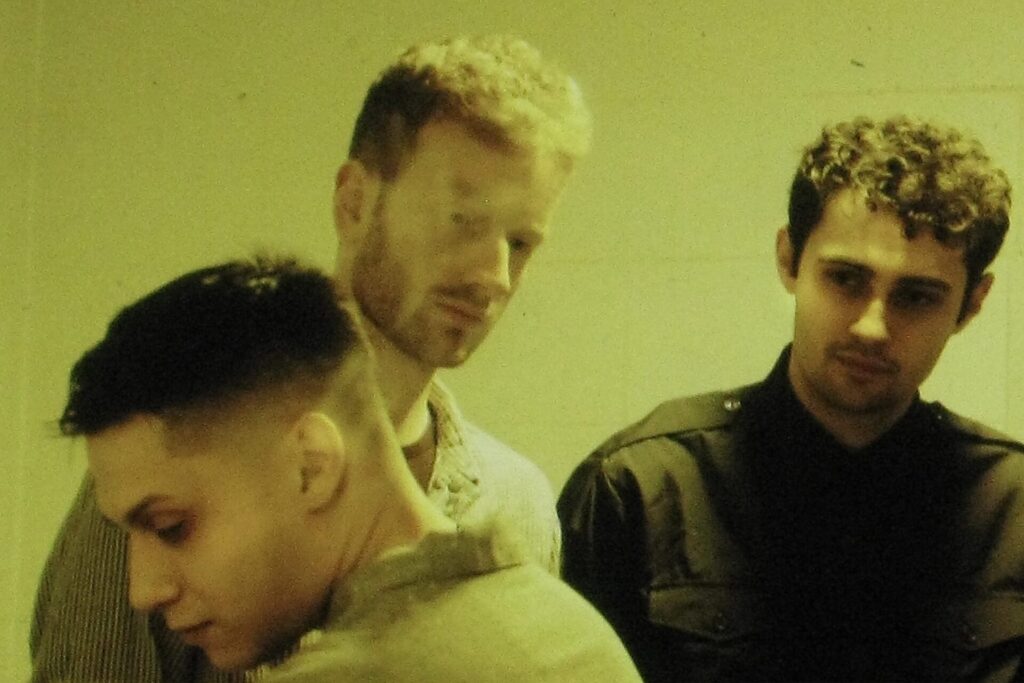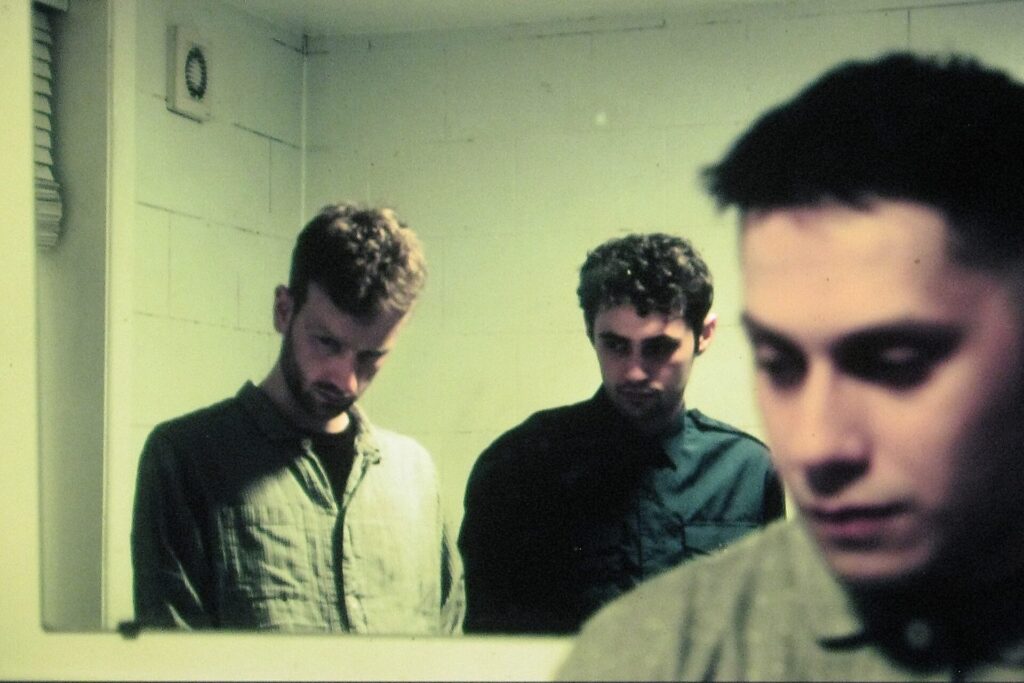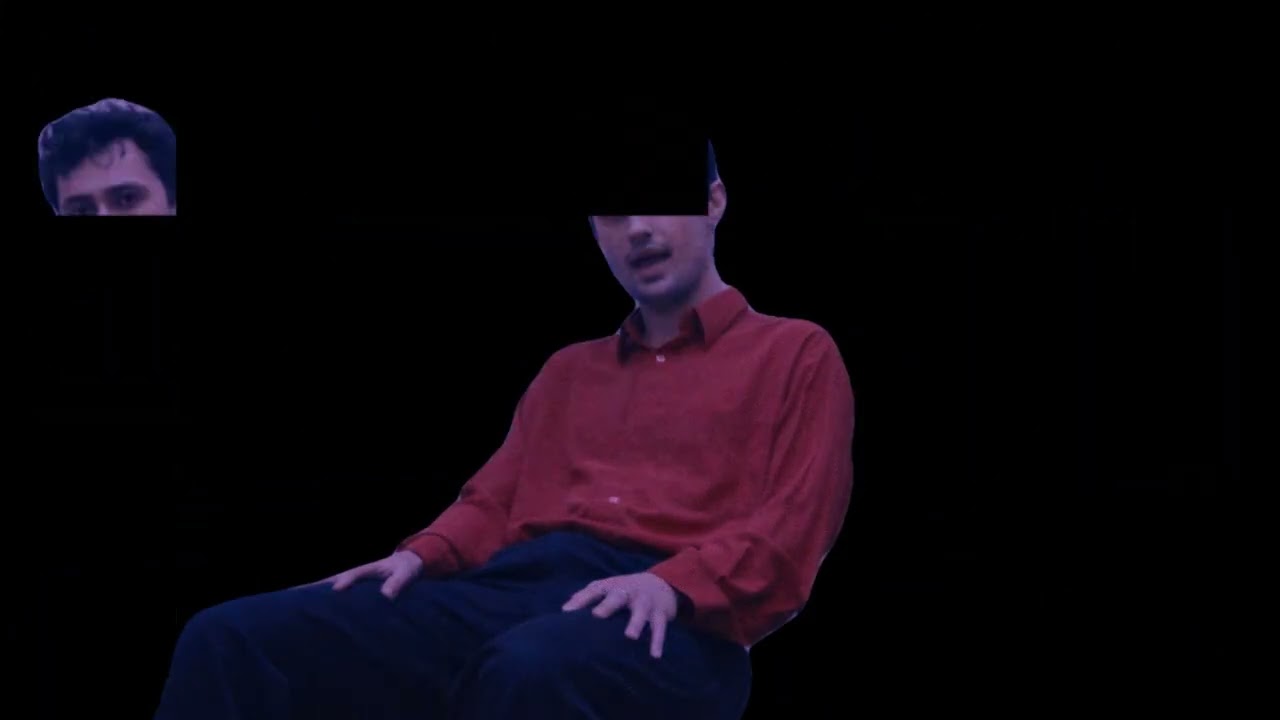Heaven, Ebbb demonstrate on ‘Himmel’, is to be found on a pillowy cloud of grainy synth pads, then invaded by an almighty, merciless, double-speed kick, and – once it has been sufficiently pummelled – left to breathe in a flash of glittering chords that fade just as quickly as they emerged. Floating on top is the dulcet falsetto of vocalist Will Rowland, whose lyrics parallel the music’s ephemerality: “When you move at a different pace / Two heads in a different place / When you fall from a distant height / Then again, you’re out sight”.
The London three-piece’s debut track is one of the most intriguing of the year so far. It’s a concoction brewed only by the unique chemistry of Rowland, producer Lev Ceylan and drummer Scott MacDonald, and the tantalising introduction to their upcoming EP All At Once.
Ebbb’s sound is frustratingly difficult to pin down. Their ferocity stems from experimental hip hop groups such as Death Grips, but the industrial kicks are too techno-inflected to place them in that world. The wonky time signature change in ‘Swarm’ makes it unsuitable as conventional dance music, whilst Rowland’s voice takes inspiration both from the worlds of classical and contemporary. Ceylan reckons they’re “a very over-the-top singer-songwriter project, in a weird way”. What binds Ebbb, really, is their attitude: the desire to create music that reaches outwards to the extreme. It manifests in their captivating live shows, which impressed Black Country, New Road manager Dan McEvoy by their sixth show at The Windmill.
Ebbb was a leap of faith for the trio, who were all looking for a blank slate having played with other bands for years prior. First-time producer Ceylan is originally from Germany, growing up listening to metal and eventually getting into techno via his friends. He moved to London after a previous stint working as a sound tech at Munich’s Isar Philharmonic concert hall, where he was exposed to classical music: “You see a whole spectrum: this is more intense than any metal band there ever was.”
MacDonald shares that same drive for intensity. Having been involved in various emo and rock bands in Glasgow, he moved to London to study at Goldsmiths, but wanted to find a more permanent home for his drumming. “For me, there was always this dream to just be in an original band and be able to sustain yourself, to not do anything else other than be involved in music and write it yourself,” he tells me. “We play shows and people sing bits of lyrics back. That feeling of presenting something and people internalising it and giving it back to you – it’s hard to go back from that.”
And then there’s London native Rowland, who met Ceylan through his solo project. He grew up amid the “intense” environment of performing in the Westminster Abbey Choir, often singing for up to seven hours a day, continuing to sing in choirs through his time at Oxford University. Simultaneously, he also took inspiration from post punk and new wave outliers like David Byrne, and he struggled to reconcile the two disparate influences until he met Ceylan.
“I’ve always wanted to do alternative music,” Rowland says. “Lev was like, ‘Can you sing like that on this project?’ It’s nice for me to be able to use that training in a very sincere way where I don’t have to mess around with my voice and just do it as it is […] Within the classical context, it’s all repertoire-based. It’s written, notated scores that you’re singing. The most creative space I’ve been in was this project. It was really refreshing and different, because I spent years singing from scores – as much as I love that.”
It was Rowland’s vocal tone that stuck out for Ceylan, having grown up away from London’s burgeoning post punk revival: “Having a wall of bands that do all this post punk, spoken word, shouty stuff, there’s someone who has straight-up, knife-esque melodies coming out really sharp and bright,” he tells me. Rowland, he says, never tried to be “dissonant for the sake of it”.
Perhaps that’s down to Rowland’s love for melody, which he deems the “crowning” aspect of their music. “Writing good melodies is, to me, something that I value more than atmosphere and poetry,” he explains. Rowland takes more of a cue from 90s dreampop bands like Cocteau Twins and Mazzy Star than the Gregorian chant one might presume. “I really, really like melodies where the keynote is dissonant and then it resolves,” he says. “I think all of my favourite melodies have that aspect, it’s not consonant the whole way through. You might not necessarily notice it, but it creates that emotional anguish. Broadcast do that all the time.”
Broadcast, he adds, have also shaped his approach to lyrics: “I’ve always liked things that aren’t too overly specific, I guess the kind of ethereal words in Broadcast songs that are slightly ambiguous. Stuff that’s a bit introspective, mysterious. I like melancholy…” he cracks a guilty smile and laughs. “I like Morrissey’s lyrics!” Often, Ceylan will send Rowland an instrumental, and he will respond to it with melodies and lyrics that match its mood. “It’s like an internal monologue. The freneticism of the music almost embodies that, which is quite cool, because it moves around so much.” But he’s coy when asked where that anxiety comes from. “My brain, I guess,” he jokes.
The one notable exception to this rule is on ‘Swarm’, which sees Rowland lament a flock of sheeple: “Convinced of their aim / Detached from the pain / Dogma entrenched in their veins / No original thought they retain.” It’s about “people getting very obsessed and attached to an issue that perhaps they have no background in or any emotional tie to,” he explains. “People jumping on the bandwagon and not necessarily reading about it.” But again, he’s evasive when pressed if there’s any particular issue he’s referring to: “It’s just a general phenomenon, nothing in particular.”

Another curiosity of Ebbb’s music is the way they straddle the lines of extremity and nuance. In a world where deliriously flamboyant strains of medieval techno exist, Ebbb incorporate their influences with sophistication. There’s a jaunty flute rhythm that opens ‘Answered’ with a hammering four-to-the-floor rhythm, while ‘Torn’ adapts an 8th century plainchant and pits it against a formidable gabber beat that manages to intensify even further as the song progresses. Somehow, it never sounds incongruous or gimmicky.
Rowland says Ceylan used to use the expression ‘emotional uncanniness’, and it neatly summarises what makes Ebbb so compelling to listen to: “I think the beautiful and noisy elements don’t have to exist in opposition to each other. When it’s combined, they create something that’s emotionally confusing. It’s a lot more interesting.”
Maybe it’s also due to the band’s concern with “waste”, a word they use often during our conversation. There shouldn’t be a second wasted in music, they argue, and Ebbb is the vehicle for everyone to reach their “full potential”. That extends to the songs they write, Ceylan explains: “for example, if there’s something moving and rhythmical, the responsibility of someone who writes that music should be to max it out, because you perform it live to the people. Why not just go the extra mile in whatever direction the idea is?”
It’s taken from the ideals of the grindcore Ceylan grew up with, he says: “The only genre I would listen to where no song wasted any moment would be really extreme stuff, like grindcore. And that’s always how I like to approach music: every section counts.”
Their no-frills approach is also what makes their live shows so fascinating to watch. Drummer MacDonald, who has the difficult task of translating Ceylan’s precise beats onto the stage, galvanises the rumbles of ‘Himmel’ by using mallets, ensuring its rhythms are just as commanding as they are in headphones. “I always think that intensity is something to try and achieve,” he says. “And it’s almost as if when you get on stage and you perform what you have, you don’t want to waste a single second: you want to present the fullest of what you have. That’s why you still want to be gripping in some way.”
The “lack of compromise”, as MacDonald puts it, is what pushes not only the music forward, but every member of Ebbb as well. “We’ve found this opportunity in our music to just be at the maximum of our ability to reach our capabilities, whatever we’re doing. We’ve suddenly got this freedom to push ourselves and deliver as much as possible: to minimise the compromise.”
Ebbb’s debut EP All At Once is released on 14 June via Ninja Tune



